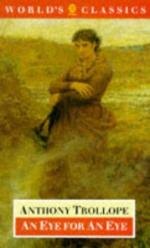Then he asked after Mrs. O’Hara. “Yes; mother is there. She will be almost as glad to see you as I am. Nobody can be quite so glad. Oh Fred,—my darling Fred,—am I still to call you Fred?”
“What else, my pet?”
“I was thinking whether I would call you—my Lord.”
“For heaven’s sake do not.”
“No. You shall be Fred,—my Fred; Fred to me, though all the world besides may call you grand names.” Then again she held up her face to him and pressed the hand that was round her waist closer to her girdle. To have him once more with her,—this was to taste all the joys of heaven while she was still on earth.
They entered the sitting-room together and met Mrs. O’Hara close to the door. “My Lord,” she said, “you are very welcome back to us. Indeed we need you much. I will not upbraid you as you come to make atonement for your fault. If you will let me I will love you as a son.” As she spoke she held his right hand in both of hers, and then she lifted up her face and kissed his cheek.
He could not stay her words, nor could he refuse the kiss. And yet to him the kiss was as the kiss of Judas, and the words were false words, plotted words, pre-arranged, so that after hearing them there should be no escape for him. But he would escape. He resolved again, even then, that he would escape; but he could not answer her words at the moment. Though Mrs. O’Hara held him by the hand, Kate still hung to his other arm. He could not thrust her away from him. She still clung to him when he released his right hand, and almost lay upon his breast when he seated himself on the sofa. She looked into his eyes for tenderness, and he could not refrain himself from bestowing upon her the happiness. “Oh, mother,” she said, “he is so brown;—but he is handsomer than ever.” But though he smiled on her, giving back into her eyes her own soft look of love, yet he must tell his tale.
He was still minded that she should have all but the one thing,—all if she would take it. She should not be Countess of Scroope; but in any other respect he would pay what penalty might be required for his transgression. But in what words should he explain this to those two women? Mrs. O’Hara had called him by his title and had claimed him as her son. No doubt she had all the right to do so which promises made by himself could give her. He had sworn that he would marry the girl, and in point of time had only limited his promise by the old Earl’s life. The old Earl was dead, and he stood pledged to the immediate performance of his vow,—doubly pledged if he were at all solicitous for the honour of his future bride. But in spite of all promises she should never be Countess of Scroope!




